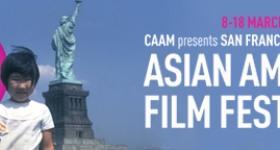Hyphen speaks with Hong Kong auteur Tsui Hark about his latest film Detective Dee and his thoughts on a 3D future for Martial Arts films.
Pictured: Tsui Hark (courtesy of Indomina Releasing)
Anyone familiar with Hong Kong cinema will instantly recognize the name Tsui Hark. A veteran filmmaker who has directed 44 movies and produced a handful more, Tsui has been an instrumental figure in bringing Hong Kong films to the attention of movie audiences around the world through his unique brand of action/fantasy films. Some of his best known works -- including the A Better Tomorrow Trilogy, Peking Opera Blues, The Swordsmen Trilogy, Once Upon a Time in China Trilogy -- are all part of the world cinema canon.
However, a brief venture in Hollywood didn’t yield the expected results, as Tsui was unfortunately forced to work with Jean-Claude Van Damme (Knock Off & Double Team) and deal with well documented meddling by studios. Misunderstood and underused by Hollywood, Tsui returned to Hong Kong in 2000 and immediately hit the ground running again with the action hit Time and Tide, featuring a new generation of Hong Kong stars. Since then, Tsui has returned to making his trademark fantasy martial art films that won him the adoration of movie fans around the world. His latest, Detective Dee and the Mystery of the Phantom Flame -- reviewed by Hyphen -- came out in 2010 in China and immediately became a national sensation. The movie is being released this weekend in New York and Los Angeles, with 20 other US cities to follow in the next two weeks. Hyphen had a chance to speak with Tsui Hark over the phone about Detective Dee and his views on filmmaking today.
Detective Dee features a lot of CG work which is quite a departure from your work in the 80s and the 90s. How has the advent of computer graphics influenced you as a filmmaker?
Shooting a period movie is quite a challenge, especially one such as Detective Dee, which is about a very special period in China's history -- very rich in culture, different from other dynasties in China. I have to come up with very different kind of visuals to reflect the multicultural, metropolitan nature of the period. At first that was very difficult for me because we don’t have such locations to shoot in China anymore, and thus we have to use special effects elements in the film in order to show what I have in mind. For me it was quite a challenge as I had to use some not very suitable CG effects in order to complete the production.
What can 3D technology do for the Martial Arts genre?
3D is a very good tool for fantastic visual material. I was long interested in 3D movies, even a long time ago when I was a kid, when 3D movies were quite visually disorienting and not very a convincing effect. But then again, the fun of having something different from a 2D nature, especially for new generations of audiences, will provide an interesting experience. I think also because movies are sharing audiences’ time with TV and the Internet, even with a bigger screen [of theaters], movies still have to be different from other mediums. Thus when the possibility for 3D came up, it was right away an attraction to me as a filmmaker, as I want to try how that can affect storytelling, how the 3D affect the story that are traditionally told in a 2D style.
In the martial arts genre, it’s always the psychological anticipation of something coming toward the audience, something that appears during a fight sequence of fantastic visual appeal, that makes the viewer feels like he’s in the story. How do you create that today? I think 3D can enhance that anticipation, especially if you tell the story in the right manner.
Your next movie is a remake of Dragon Inn. Why take on such a classic film that itself is already a remake?
The new movie is not a remake, but rather a continuation of the same story from the first Dragon Inn. I'm not a fan of remakes because I always have strong impressions for the original, especially if they are good movies. So why remake a classic? It's not the right manner or show of respect toward the original and the filmmakers who produced it.
What about continuing the stories of popular films such as Swordsmen II or Peking Opera Blues?
This question is given to me a lot whether I want to make movies I made in the past. It's a very difficult question to answer, because today I can't find people who can play the roles played by actors in the past, especially for movies like A Better Tomorrow or Peking Opera Blues, they are very very classic, featuring symbols like Leslie Chung and Chow Yun Fat. As I have a lot of respect for the artists who had been involved in those movies, I only want to keep them in the way that pays tribute to their work and performance.
In the last 10 years Korean movies have emerged as the most popular national cinema in Asia. How can Hong Kong cinema return to its peak achieved in the 80s and the 90s?
In the last 10 years Hong Kong movies have been gradually moving to the market in China. And in that market, there is some degree of restriction on the subjects of the films we can make. We are very much constrained by the kind of rules and taboos of the censorship bureau. So during this period of time is a period of transition, and filmmakers are looking for the possibility of how to make Hong Kong films, while succeeding in China, as a way for the industry to exist, so then we can still go back to something we treasure in the past, and explore something interesting in the current situation. I think this next 10 years is when we experience a new environment for the market. Even if it is still a period of adapting to the situation, I would expect something coming very soon, that would be what we call New Hong Kong cinema.









Comments